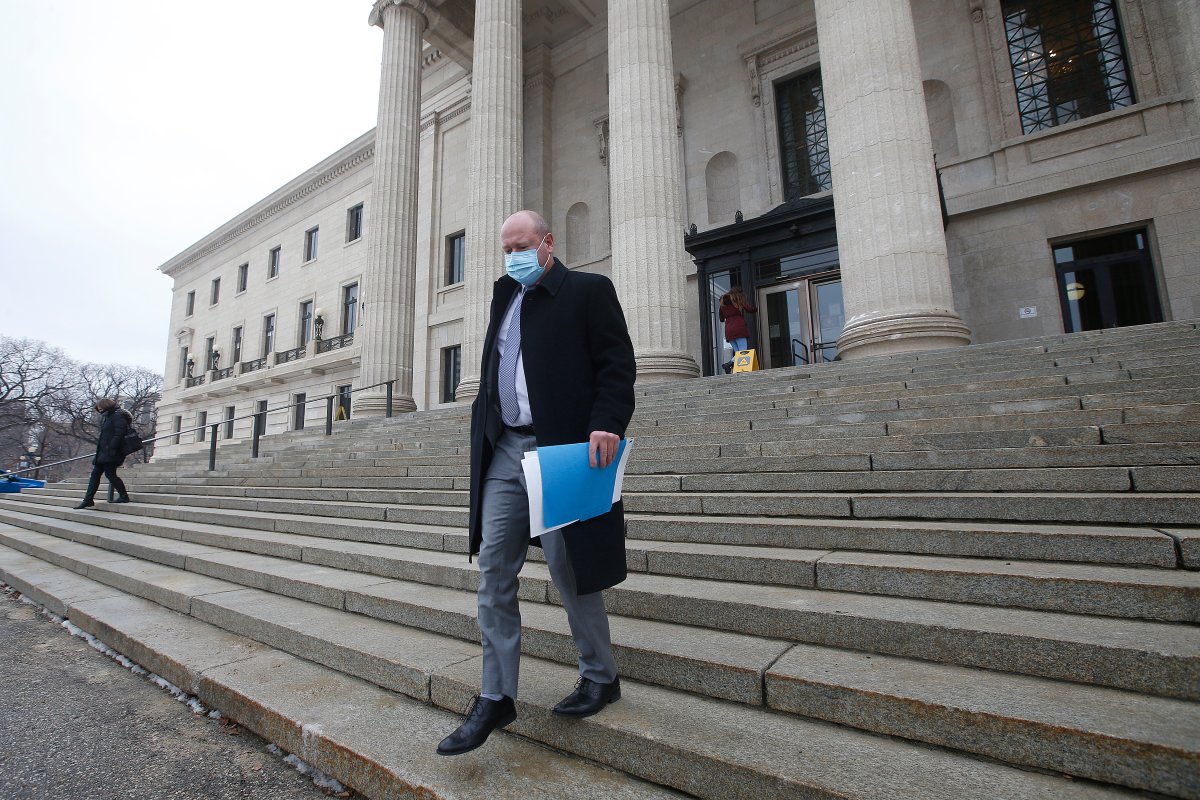Manitoba’s chief provincial health officer is testifying Friday in a court challenge that seeks to limit his powers.

Dr. Brent Roussin took the stand in a Manitoba courtroom to answer questions about public health restrictions during the COVID-19 pandemic.

Seven rural Manitoba churches are challenging his right to enforce restrictions around public gatherings and businesses during a public health crisis.
The group argues Roussin’s public health orders and decisions are made without elected oversight.
The churches’ lawyer, Jared Brown, spent part of the morning questioning Roussin about the accuracy of the PCR test, commonly used to determine whether a person has an active case of COVID-19.
The doctor told court he thought “too much was being made of the limitations of a very, very good test.”
- Gas station clerk stabbed several times during violent attack at Ultramar in Montreal
- Man acquitted in Tina Fontaine murder found dead, says her aunt
- Cars torched, explosions heard in suspected arson in Montreal neighbourhood
- Canadians should expect politicians to support right to bail, Virani’s office says
“Is it possible some people aren’t infectious when they have a PCR test? Yes,” said Roussin, who added that the results of the test were still reflective of what the health-care system was seeing.
“Our hospitals were full of COVID-19 patients, our ICUs (intensive care units) were full of COVID-19 patients…. We had to act on the trends we were seeing and we were in a crisis.”
Brown also questioned the objectives of public health orders and asked where public health was receiving guidance on the restrictions it has implemented.
Roussin said they examine jurisdictions all across the world and received advice from the Public Health Agency of Canada.
Health officials’ goal, Roussin explained, is to have the least restrictive measures necessary to prevent the spread of the virus and “to minimize its impact directly on people, but also its impact on our health-care system, which is strained yet again.”
He pushed back against a suggestion that the original intention of restrictions was to “flatten the curve” within two weeks.
“When we went to critical red in November, I do remember having those orders at first trying to message to Manitobans there is hope and we did institute those for two weeks at a time,” Roussin said.
The concept, Roussin said, was to minimize transmission as a means to protect the health-care system and to protect the functioning of society by limiting work absences.
“When we talk about societal disruption, having widespread illness in the younger population — even if we ignore the direct severe effects COVID will have on some of that younger population — those are health-care workers that will be off of work, those are critical infrastructure workers, these are our first responders,” Roussin said.
“So this has severe societal and economic impact, allowing a pathogen like this to be transmitted without check.”

He went on to explain that health officials are cognizant of other impacts resulting from public health orders, and these are always “considered and balanced,” but admitted it’s possible the full repercussions of the orders may not be understood while in the midst of the pandemic.
Later, Brown pressed Roussin on whether or not systematic risk assessments or harm-benefit analysis of health orders on mental health, loneliness, substance use, and other conditions had been done.
Dr. Roussin testified he’s “engaged widely” with various health experts nationally and internationally, and said health officials are aware of the potential harms of health restrictions, and the decisions are never made lightly.
He also pointed out the pandemic itself was taking a toll on people’s mental health.
On Wednesday, chief public nursing officer Lanette Siragusa testified, saying nurses and hospital staff were exhausted while they faced hard choices during the second wave of the COVID-19 pandemic.
She was questioned about the strain on hospitals, specifically on intensive care capacity. Brown questioned why Siragusa cited 72 intensive care beds when asked about capacity prior to the pandemic, when data he was provided by the province said there were 86.
Read the constitutional challenge here:
She responded that the extra beds were specifically for cardiac patients.
Brown also questioned Siragusa about a delay in 16,000 elective surgeries.
The chief nursing officer responded that medical experts and surgeons were making decisions about which surgeries to delay and there were no public health orders to that effect.
“Those were really hard decisions that we had to make as a health system and it was not comfortable for anyone.”








Comments